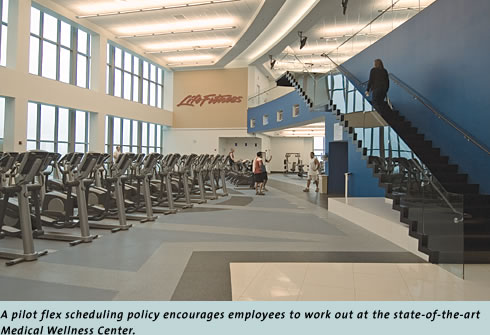Flexible
Scheduling Policy Promotes Wellness Regimen
for Employees
 ith
busy workdays, finding time to exercise can be challenging. But with
a flexible schedule program the Department of Pediatrics piloted, most
mornings program administrator Miriam Escobar gets to the Medical Wellness
Center by 7:30 a.m., does a comprehensive workout, and is behind her
desk by 9:30 a.m., an hour later than standard.
ith
busy workdays, finding time to exercise can be challenging. But with
a flexible schedule program the Department of Pediatrics piloted, most
mornings program administrator Miriam Escobar gets to the Medical Wellness
Center by 7:30 a.m., does a comprehensive workout, and is behind her
desk by 9:30 a.m., an hour later than standard.

Javier Salazar, a senior staff associate with the Pediatric Residency Training Program, also finds time, sometimes in the middle of the day, to take advantage of the center’s two floors of sleek Life Fitness equipment, personal training, and other activities such as spinning, Pilates, and yoga.
“We all want to work out, but it can be very difficult to schedule,” says Salazar, who works out several times a week. “So what my department is doing is very helpful. We get to build fitness into our day.”
Under the flex policy, Salazar, Escobar, and their department colleagues are encouraged to make use of the center at convenient times, even during normal working hours. Employees still account for their required hours, but arrange with supervisors to come in early or work later, or take extended lunch breaks and then make up the time.
“We wanted to be proactive to show how much we value employees’ health, so we got all the supervisors on board,” says Dennis Harris, assistant chair for administration in the Department of Pediatrics. “There was no downside to this. A healthier workforce is a happier workforce.”
Medical Human Resources is encouraging other departments to follow suit.
“There are many studies that highlight wellness
programs improving the health of employees while also lowering health
care costs,” says
Paul Hudgins, Miller School associate vice president for medical human
resources. “The University is committed to working in partnership
with faculty and staff to help them improve their health by encouraging
participation in robust wellness programs.”